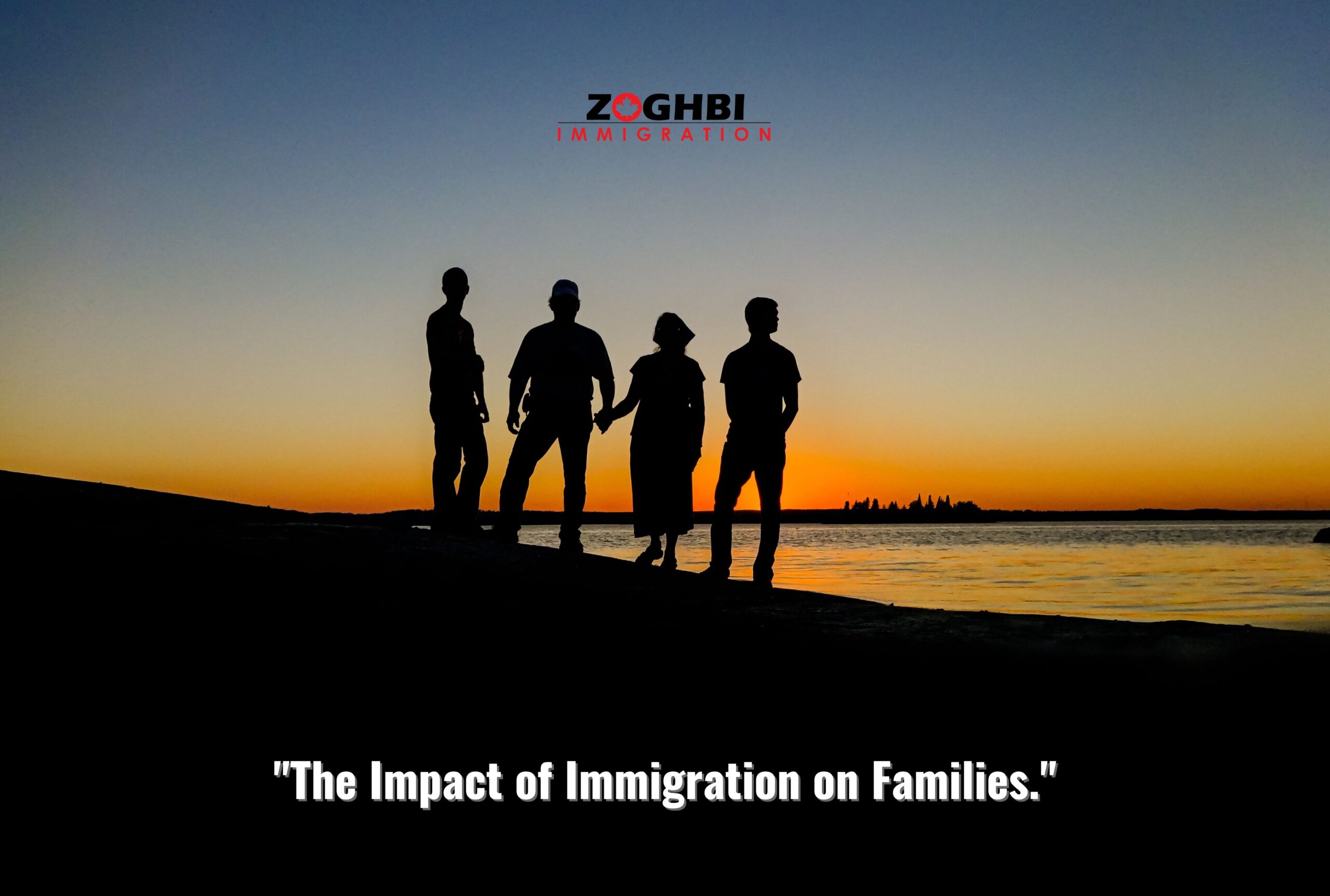The Impact of Immigration on Families
تأثير الهجرة على العائلات
المقال مترجم للعربية بالأسفل
The Psychological and Social Effects of Immigration on Family Members in Canada
Immigration is an experience associated with enormous transformations for individuals and families and greatly affects their psychological and social lives. When they decide to immigrate to Canada, this decision involves many challenges and opportunities that may significantly impact the lives of family members. In this article, we will review the psychological and social impact of immigration on families in Canada.
One of the main impacts of migration on families is psychological. These effects can include feeling lonely and alienated in a new environment, enduring the psychological stresses associated with adapting to a new culture and language and balancing between maintaining cultural identity and adapting to the host society. These challenges can result in increased levels of stress and anxiety among family members. On the other hand, immigration provides new opportunities for family members, such as access to better job opportunities, quality education for children, and the strong social and health protection that Canada offers. These opportunities can help improve a family’s overall quality of life and increase levels of well-being.
In addition to the psychological impact, family members also face social challenges due to migration. These challenges can include difficulty adapting to a new and different lifestyle, overcoming cultural and social barriers in interacting with the host community, and building new social networks. However, Canada can provide support and resources for immigrant families to deal with these challenges effectively. The Canadian government offers immigration and settlement support programs, including psychosocial support, career guidance, education about Canadian culture, and intercultural communication support.
Immigration can be a profoundly impactful experience for families in Canada, combining psychological and social challenges and opportunities. However, with the right support and resources, immigrant families can adapt and thrive in their new communities in Canada.
The psychological impact of immigration on families:
- Loss of social support: Immigrant family members may face a loss of social support that they relied on in their country of origin. They can feel isolated and lonely at the beginning of their new journey in Canada.
- Linguistic challenges: Difficulties communicating in a new language can be a major factor in increasing levels of stress and anxiety. Individuals may find it difficult to socialize and access basic services such as health care and education.
- Cultural adaptation pressures: Family members may be exposed to cultural adaptation pressures, such as understanding and adapting to new values and customs. This can be especially difficult for children who find themselves in a new school environment that is different from what they knew.
The social impact of immigration on families:
- Change in family dynamics: A radical change in the environment and culture may lead to a change in family dynamics. Roles, responsibilities, and communication within the family may shift due to adjustment to new life in Canada.
- Building a new belonging: Over time, new experiences and interactions with the local community may contribute to building a new belonging and appreciation for Canadian identity. Connecting with the local community and participating in social activities can play an important role in this process.
- Economic challenges: Families who immigrate to Canada may face economic challenges, such as searching for suitable job opportunities and achieving financial stability in the new country. These challenges can lead to social pressures on the family in general.
In sum, the impact of immigration on families in Canada appears to extend to many psychological and social aspects. It is important to understand these challenges and confront them effectively by providing the necessary support and promoting the social and cultural integration of immigrant families in their new society.
الأثر النفسي والاجتماعي للهجرة على أفراد الأسرة في كندا
الهجرة هي تجربة تقترن بتحولات هائلة للأفراد والأسر، وتؤثر بشكل كبير على حياتهم النفسية والاجتماعية. عندما يقررون الهجرة إلى كندا، ينطوي هذا القرار على العديد من التحديات والفرص التي قد تؤثر بشكل كبير على حياة أفراد الأسرة. في هذا المقال، سنستعرض تأثير الهجرة على العائلات من الناحية النفسية والاجتماعية في كندا.
أحد التأثيرات الرئيسية للهجرة على العائلات هو التأثير النفسي. يمكن أن تشمل هذه التأثيرات الشعور بالوحدة والغربة في بيئة جديدة، وتحمل الضغوط النفسية المرتبطة بالتكيف مع ثقافة ولغة جديدة، وتحقيق التوازن بين الحفاظ على الهوية الثقافية والتكيف مع المجتمع المضيف. يمكن أن يترتب عن هذه التحديات زيادة مستويات التوتر والقلق لدى أفراد الأسرة. من ناحية أخرى، توفر الهجرة فرصًا جديدة لأفراد الأسرة، مثل الحصول على فرص عمل أفضل، والتعليم الجيد للأطفال، والحماية الاجتماعية والصحية القوية التي تقدمها كندا. يمكن أن تساعد هذه الفرص في تحسين جودة الحياة العامة للأسرة وزيادة مستويات الرفاهية.
وبالإضافة إلى التأثير النفسي يواجه أفراد الأسرة أيضًا تحديات اجتماعية بسبب الهجرة. يمكن أن تشمل هذه التحديات صعوبة التكيف مع نمط حياة جديد ومختلف، والتغلب على العوائق الثقافية والاجتماعية في التفاعل مع المجتمع المضيف، وبناء شبكات اجتماعية جديدة. ومع ذلك يمكن لكندا أن تقدم الدعم والموارد للأسر المهاجرة للتعامل مع هذه التحديات بشكل فعال. تقدم الحكومة الكندية برامج دعم للهجرة والاستقرار، بما في ذلك الدعم النفسي والاجتماعي، والتوجيه المهني، والتعليم عن الثقافة الكندية، ودعم التواصل بين الثقافات.
يمكن أن تكون الهجرة تجربة تأثيرها عميق على العائلات في كندا، وتجمع بين التحديات والفرص النفسية والاجتماعية. ومع ذلك، من خلال تقديم الدعم والموارد المناسبة، يمكن للأسر المهاجرة أن تتكيف وتزدهر في مجتمعاتها الجديدة بكندا.
تأثير الهجرة على العائلات النفسي:
- فقدان الدعم الاجتماعي: قد يواجه أفراد العائلة الهاجرة فقدانًا للدعم الاجتماعي الذي كانوا يعتمدون عليه في بلدهم الأصلي. يمكن أن يشعروا بالعزلة والوحدة في بداية رحلتهم الجديدة في كندا.
- التحديات اللغوية: يمكن أن تكون صعوبات التواصل باللغة الجديدة عاملاً رئيسيًا في زيادة مستويات الإجهاد والقلق. قد يجد الأفراد صعوبة في التفاعل الاجتماعي والحصول على الخدمات الأساسية مثل الرعاية الصحية والتعليم.
- ضغوطات التكيف الثقافي: يمكن أن يتعرض أفراد الأسرة لضغوطات تكيفية ثقافية، مثل فهم القيم والعادات الجديدة والتكيف معها. قد يكون ذلك صعبًا خاصة بالنسبة للأطفال الذين يجدون أنفسهم في بيئة مدرسية جديدة تختلف عما كانوا يعرفونه.
تأثير الهجرة على العائلات الاجتماعي:
- التغيير في ديناميكية الأسرة: قد يؤدي التغيير الجذري في البيئة والثقافة إلى تغيير في ديناميكية الأسرة. قد تتحول الأدوار والمسؤوليات والتواصل داخل الأسرة بسبب التكيف مع الحياة الجديدة في كندا.
- بناء الانتماء الجديد: مع مرور الوقت، قد تسهم التجارب الجديدة والتفاعل مع المجتمع المحلي في بناء انتماء جديد وتقدير للهوية الكندية. يمكن أن يلعب التواصل مع المجتمع المحلي والمشاركة في الأنشطة الاجتماعية دورًا هامًا في هذه العملية.
- التحديات الاقتصادية: قد تواجه العائلات التي تهاجر إلى كندا تحديات اقتصادية، مثل البحث عن فرص عمل ملائمة وتحقيق استقرار مالي في البلد الجديد. يمكن أن تؤدي هذه التحديات إلى ضغوط اجتماعية على العائلة بشكل عام.
باختصار، يظهر أن تأثير الهجرة على العائلات في كندا يمتد إلى جوانب نفسية واجتماعية عديدة. ومن المهم أن نفهم هذه التحديات ونواجهها بشكل فعال من خلال توفير الدعم اللازم وتعزيز التكامل الاجتماعي والثقافي للعائلات المهاجرة في مجتمعها الجديد.




